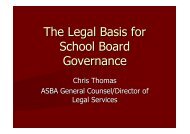The Arizona Open Meeting Law - Arizona School Boards Association
The Arizona Open Meeting Law - Arizona School Boards Association
The Arizona Open Meeting Law - Arizona School Boards Association
You also want an ePaper? Increase the reach of your titles
YUMPU automatically turns print PDFs into web optimized ePapers that Google loves.
a public meeting. Id.; see Ariz. Att'y Gen. Op. I79-49. <strong>The</strong>re is no emergency exception to<br />
the requirement that an affected officer, appointee, or employee receive at least twentyfour<br />
hours' notice. However, the public body can discuss personnel matters in a public<br />
meeting with less than twenty-four hours' notice if an actual emergency exists. A.R.S. §<br />
38-431.02(D). See Sections 7.6.5 and 7.7.9.<br />
Although the public body may permit the public officer, appointee, or employee being discussed<br />
to attend the executive session, the <strong>Open</strong> <strong>Meeting</strong> <strong>Law</strong> is unclear whether he has<br />
the right to attend. Whether he attends or not, the public body must make the minutes of<br />
the executive session available to the public officer, appointee, or employee who was the<br />
subject of discussion in the executive session. A.R.S. § 38-431.03(B)(2). A public body<br />
may consider several persons for possible appointment to a position or consider several<br />
employees for possible disciplinary action. In such cases, the public body may consider<br />
the matter in executive session provided all those being considered are given the required<br />
notice. If some, but not all of those given notice request a public meeting, the public body<br />
has two options: the public body may limit the public discussion to those persons filing<br />
the request and discuss the remaining persons in an executive session; or, because the<br />
<strong>Open</strong> <strong>Meeting</strong> <strong>Law</strong> does not require the public body to discuss personnel matters in executive<br />
session, the public body may discuss the entire matter in a public meeting.<br />
Public bodies should take care to ensure that the scope of executive sessions for personnel<br />
discussions is limited to true personnel matters. <strong>The</strong> Attorney General has opined that<br />
the <strong>Open</strong> <strong>Meeting</strong> <strong>Law</strong> prohibits public bodies from conducting in executive sessions<br />
lengthy information gathering meetings that explore the operation of public programs<br />
under the guise of conducting a personnel evaluation. Only the actual evaluation - discussion<br />
or consideration of the performance of the employee - may take place in an executive<br />
session. Ariz. Att'y Gen. Op. I96-012. A public body that wishes to discuss or consider an<br />
employee's evaluation in executive session, pursuant to A.R.S. § 38-431.03(A)(1), should<br />
adopt a bifurcated process that would permit the public body to gather information about<br />
public programs at a public meeting, while allowing the public body to enter executive<br />
session to discuss or consider the actual evaluation. Ariz. Att'y Gen. Op. I96-012.<br />
7.9.5 Confidential Records. An executive session may be held when the public body<br />
is considering or discussing "records exempt by law from public inspection." A.R.S. § 38-<br />
431.03(A)(2). This specifically includes situations in which the public body is receiving<br />
and discussing "information or testimony that is specifically required to be maintained as<br />
confidential by state or federal law." Id. This provision allows the use of an executive session<br />
whenever the public body intends to discuss or consider matters contained in records<br />
that are confidential by law. See Ariz. Att'y Gen. Ops. I90-058, I87-131. However, when<br />
confidential matters can be adequately safeguarded, the discussion may take place during<br />
a public meeting. Cf. Ariz. Att'y Gen. Op. I87-038 (medical records). <strong>The</strong> record being<br />
considered need not be expressly made confidential by statute, but rather may fall within<br />
the category of confidential records discussed in Chapter 6 of this handbook. For example,<br />
to preserve confidentiality, preliminary audit reports of state agencies prepared by the<br />
Auditor General are confidential and should be discussed by the public body in executive<br />
session. Ariz. Att'y Gen. Op. I80-035. Similarly, complaints against licensees that are<br />
investigated by a public body may be discussed in executive session. Ariz. Att'y Gen. Op.<br />
I83-006. In 2000, the Legislature revised the statute to allow public bodies to take testimony<br />
in executive sessions in certain situations. Public bodies should ensure that state or<br />
- 34 -



